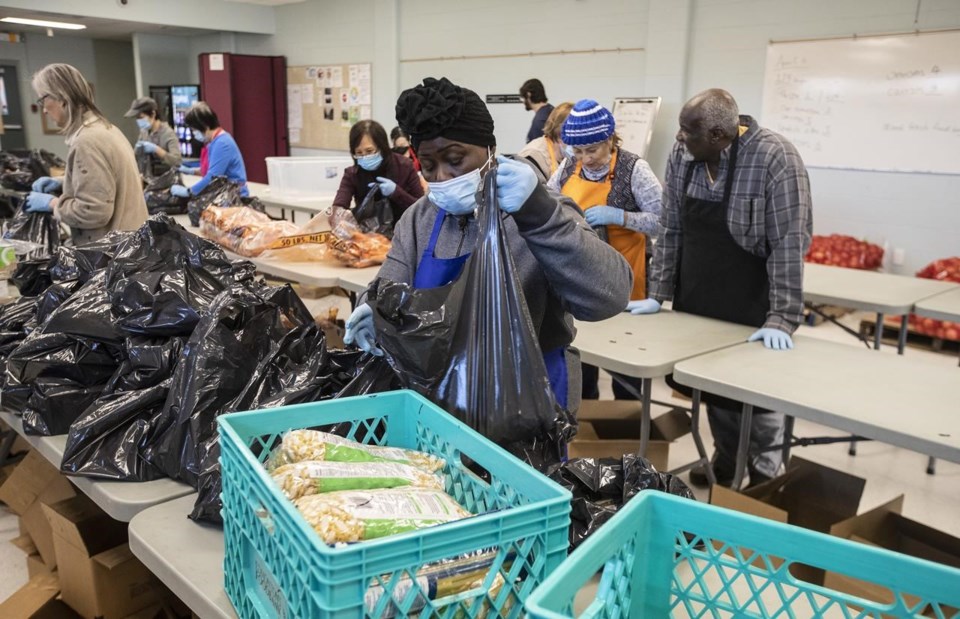EDMONTON — Jean Claude Munyezamu remembers answering a phone call from a six-year-old boy asking if his non-profit group could provide milk for his newborn sibling.
The boy, who attended Umoja Community Mosaic's drop-in soccer program, was translating for his Ethiopian-speaking mother.
"I asked, 'Do you have food?' The boy said, 'No," recalled Munyezamu, founder of the Calgary-based community group, primarily known for youth programs.
Munyezamu said he went and bought what the single immigrant mother needed for her family — a grocery bag full of ethnocultural food items and milk.
That phone call was three years ago. Since then, Munyezamu said, Umoja has served at least 1,000 immigrant families every two weeks, delivering customized grocery bags, often with dried lentils, corn flour, semolina, kidney beans and donated restaurant meals.
About one in four food bank clients in Alberta self-identified as an immigrant, refugee or visible minority group in a HungerCount report in 2022. Umoja started giving out culturally appropriate food bags after realizing the gap in the system.
"(Many immigrant families) don't know canned foods and they don't eat them," Munyezamu said.
"Can you imagine coming with a bag of food and finding that you don't recognize anything, but you have to eat it because you have no choice? It's dehumanizing."
The organization doesn't accept or give out canned food items unless it's tomato sauce for pasta, which the organization taught families how to cook, Munyezamu added.
Providing culturally appropriate food is important for immigrant families to feel that they belong, he said.
Elizabeth Onyango, a public health professor at the University of Alberta, has noticed the pattern in her ongoing research. People from ethnic backgrounds often feel food bank items are not culturally appropriate when they're seeking assistance, she said.
"If you give them canned food, they have no idea how to make that," she said. "At the end of it all, they throw it away."
In some cases, newcomers stop visiting food banks, Onyango said.
Emergency food programs are not going to address the root cause of food insecurity among newcomers and immigrants, she added.
"I think it all starts from meaningful employment ... new immigrants tend to start at lower-paying jobs,(with) more mouths to feed."
With most of their income going to housing, their families are vulnerable to food insecurity, she said.
The Umoja centre currently serves about 200 families from 49 countries, mainly from Africa and the Middle East. Food items are bought after the group consults families about their cultural roots, Munyezamu said.
He said the group had been serving about 1,000 families during the COVID-19 pandemic because it had government funding.
Recently, it has been seeing a consistent demand from immigrant families, he said. It gets 10 to 15 requests from new families a week but can only accept one or two.
An Edmonton-based multicultural group faces a similar problem with high demand for its food program and a lack of resources to meet the needs of newcomers and immigrant families.
Every Thursday morning, at least a dozen volunteers gather at the Multicultural Health Brokers Co-operative run out of McCauley School to assemble packs of rationed food for its Grocery Run, an emergency food access program. Some weeks, there is more to offer than others.
This last week, the co-operative assembled 175 bags — down from the usual 200 and what was 500 during the pandemic. They were filled with onions, potatoes, carrots, lentils, pasta, canned tomatoes and peas. There were also 40 loaves of bread for the first families to arrive.
Executive director Yvonne Chiu said the organization is struggling financiallybut stretching its dollars and making cuts so it can provide grocery hampers with culturally relevant pantry staples to those in extreme need.
Grocery Run, in partnership with Edmonton's Food Bank, has put together a list of favourite food and common staple items from different parts of the world.
While financial constraint prevents newcomers from accessing food, "they also face problems with accessing culturally appropriate food," Chiu said.
"It is a really important component of food security," she said. "Culturally relevant food is more than having adequate food. The food should be nourishing at the level of spirit, more than for the body."
Wood Buffalo Food Bank in Fort McMurray, Alta., has been offering newcomers culturally relevant food, including halal meat, for 10 years.
Executive director Dan Edwards said while the food bank provides culturally relevant staples, "we are still a food bank, and the majority of our product is donated."
"We also offer educational programming in an educational kitchen, where we teach (newcomers) how to utilize foods that are typically given out by food banks," he adds.
Food Banks Alberta CEO Arianna Scott said although food banks have been providing culturally appropriate food for years, they aren't "surprised to see additional demand for culturally sensitive and familiar food items" amid the affordability crisis.
She said there has been a shift toward culturally diverse food donations received at local food banks, but "it’s a supply chain that is often inconsistent and particularly challenging for our rural member food banks."
Scott said donors are encouraged to bring in ethnically diverse foods, including spices, to their local food banks.
This report by The Canadian Press was first published April 9, 2023.
___
This story was produced with the financial assistance of the Meta and Canadian Press News Fellowship.
Ritika Dubey, The Canadian Press




